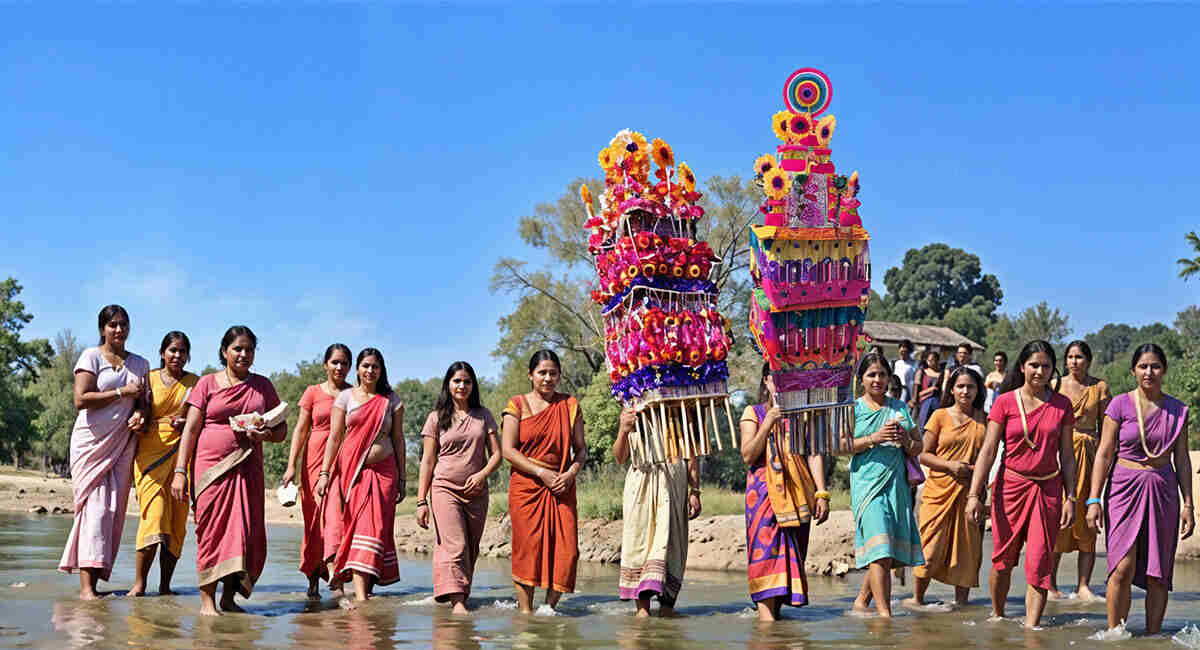Kudmi Festival: The Celebration of Ancestors by Odisha’s Tribal People
In the heart of Odisha, where hills cradle quiet villages and rivers sing ancient songs, lives a vibrant and resilient tribal community known as the Kudmi. Deeply rooted in nature and tradition, the Kudmi people are known for their reverence of ancestral spirits. Among their many cultural festivities, the Kudmi Festival is a poignant tribute to their forebears—an occasion woven with spirituality, dance, song, and a deep sense of belonging.
Who are the Kudmi People?
In some areas, the Kudmi, also known as Kurmi or Kudmi Mahato, are an indigenous tribal community residing in parts of Odisha, Jharkhand, and West Bengal. Known for their agricultural lifestyle, they are one of the region’s most hardworking and community-oriented groups. Despite the challenges of modernization, they have fiercely preserved their customs, dialects, and festivals, passing them down through generations.
The Kudmi people’s belief system is animistic and ancestral. They revere nature spirits and the souls of their ancestors, believing that these spirits watch over them and play an active role in their daily lives.
The Essence of the Kudmi Festival
The Kudmi Festival, often called “Jomnama” or simply “Ancestor Festival,” celebrates the ancestral spirits that the Kudmi believe guide and protect their families. It usually occurs during the harvest season when families bring home the first crops—a time that symbolically represents abundance, gratitude, and familial bonding.
Families perform the rituals, making the festival a private yet communal event. The celebration spreads across villages and unites people in shared remembrance.
Rituals and Offerings
The centerpiece of the Kudmi Festival is a ritual offering to ancestral spirits (Purkhon). Each family creates a sacred space within their home or courtyard, often using cow dung and colored powders to delineate the area.
Traditional Offerings Include:
- Niger seeds, rice, and pulses – Representing the fruits of their labor and harvest.
- Country liquor (Handia) – Fermented rice beer that is both an offering and a celebratory drink.
- Seasonal fruits and forest produce – Items symbolizing nature’s bounty.
- Sweets made from jaggery and rice flour – Prepared lovingly to honor the ancestors.
The head of the family, often an elder male or female, leads the prayer, invoking the spirits with chants and symbolic gestures. In some areas, a traditional Kudmi priest or village elder may oversee the rituals, mainly when conducted on a larger scale.
Music and Dancing
After the offerings, the atmosphere shifts from solemn remembrance to joyful celebration. People in the Kudmi community dress in traditional attire—women often wear vibrant sarees adorned with tribal jewelry, while men typically wear dhotis and headscarves.
They gather in open fields or community centers to perform traditional tribal dances like Jhumar and Chhau, accompanied by local instruments such as Mandar, Dhol, and Nagara. These dances are performances and storytelling mediums, often depicting myths, harvest tales, or ancestors’ heroic deeds.
The songs sung during the Kudmi Festival are folk verses passed down orally. Many of them are composed in their local dialect and are sung in a call-and-response style, building a powerful rhythm that unites everyone in spirit.
A Community-Centric Celebration
While the Kudmi Festival is rooted in family and personal history, it strongly emphasizes community values. The community honors elders, teaches children the meaning of their heritage, and exchanges food and stories with neighbors. It’s a time when generations come together, strengthening the social fabric.
It is common for married daughters to return home during this time, making it a profoundly emotional reunion. The spirit of unity and shared remembrance is palpable in every gesture—from shared meals to group dances.
A Living Heritage
The Kudmi festival isn’t just a religious celebration—it’s the soul of their culture, bringing people together through music, dance, and deep-rooted traditions. It keeps the Kudmi identity alive and vibrant, reminding each individual of their ancestral bonds, community strength, and connection to the land.
In an era that often forgets to look back, the Kudmi Festival teaches us the profound value of honoring those who came before us. It’s a celebration of life through the lens of memory, a sacred tribute that transcends time.
The Kudmi Festival offers a glimpse into the essence of Odisha’s tribal heritage, where people value and celebrate the past. It attracts anthropologists, cultural enthusiasts, and tourists interested in Indigenous customs.


